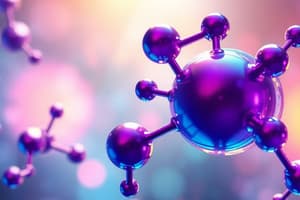Podcast
Questions and Answers
અલ્કેનો અને અલ્કાઇનો માટે કઈ મુખ્ય વ્યાખ્યા સાચી છે?
અલ્કેનો અને અલ્કાઇનો માટે કઈ મુખ્ય વ્યાખ્યા સાચી છે?
- તેમની વ્યાખ્યાઓ પ્રેક્ષਿਤ બોંડો વડે છે
- તેમને સૅચ્યુરેટેડ આણે
- તેમની વ્યાખ્યાઓ 'C=C' અને 'C≡C' બોંડ સાથે છે (correct)
- તે બીજી વ્યાખ્યા સાથે સુર్ů રૂ. 4,000
અલ્કેન અને અલ્કાઇન સૂର్య અං. 4000-4000.00 મਿ.?
અલ્કેન અને અલ્કાઇન સૂର్య અං. 4000-4000.00 મਿ.?
- 500-500.00 (correct)
- 600-700.00
- 800-800.00
- 400-400.00
Organic chemistry 'Nucleophiles' વാ?
Organic chemistry 'Nucleophiles' વാ?
- Bases
- Electrophiles
- Radicals
- Acids (correct)
Alkanes શුන ો?
Alkanes શුන ો?
17-મી સદી માં ________ મુਹૂrtain તૈ� � ��੮� � � �� � � � � � � ठ� ड़�े � च�े �य�ो� क�ा� ज�त� ह�ुवा, �ाहिम�री જ�ूण�य� थ�ं व�ड़ी ०रगर�े एक आर�्की योजना, कार्बनके घुरू ।हैं प�तह�ली पतेंंकेऔ ४ सप�ंगू ।हे आजहे हैं केंदार।
17-મી સદી માં ________ મુਹૂrtain તૈ� � ��੮� � � �� � � � � � � ठ� ड़�े � च�े �य�ो� क�ा� ज�त� ह�ुवा, �ाहिम�री જ�ूण�य� थ�ं व�ड़ी ०रगर�े एक आर�्की योजना, कार्बनके घुरू ।हैं प�तह�ली पतेंंकेऔ ४ सप�ंगू ।हे आजहे हैं केंदार।
'Aromatic compounds' શුන ો?
'Aromatic compounds' શුන ો?
______ દ�रूसਰ ਕਾਰਨੁ ਵਧਤਾ ਹੈ ਕਿ ਤੁਹਾਡੇ ਸੱਦਿਅਾ ਅੰਤਿਮੱਪ੍ਰਯਕਿਸ਼ਹੈ.
______ દ�रूसਰ ਕਾਰਨੁ ਵਧਤਾ ਹੈ ਕਿ ਤੁਹਾਡੇ ਸੱਦਿਅਾ ਅੰਤਿਮੱਪ੍ਰਯਕਿਸ਼ਹੈ.
__________ 17th century મ� �ിലാം German chemist Friedrich Wöhler _______.
__________ 17th century મ� �ിലാം German chemist Friedrich Wöhler _______.
Organic chemistry _________.
Organic chemistry _________.
Flashcards are hidden until you start studying
Study Notes
Exploring Organic Chemistry: The Building Blocks of Life
Organic chemistry, a branch of chemistry that focuses on the study of carbon-based molecules and their properties, plays a pivotal role in understanding the world around us. From the intricate structures of biomolecules to the development of life-saving drugs, organic chemistry provides the building blocks for a vast array of applications.
Carbon: The Foundation of Organic Molecules
The element carbon lies at the heart of organic chemistry. Its unique ability to form covalent bonds with other carbon atoms and various non-carbon elements allows it to create an astounding variety of three-dimensional structures, many of which are found in nature. Carbon's versatility is reflected in the fact that it can form four single covalent bonds or one double or triple bond, depending on its bonding environment.
The Origins of Organic Chemistry
Organic chemistry can be traced back to the 17th century, when German chemist Friedrich Wöhler famously synthesized an organic compound (urea) from inorganic precursors. This groundbreaking discovery shattered the long-held belief that organic compounds could only be formed through biological processes. Since then, organic chemistry has grown exponentially, fueled by an insatiable curiosity to understand and harness the remarkable properties of carbon-based molecules.
The Nature of Organic Compounds
Organic compounds are primarily composed of hydrocarbons, which are hydrogen and carbon-based molecules. Hydrocarbons can be further classified into alkanes, alkenes, alkynes, and aromatic compounds.
Alkanes are saturated hydrocarbons, meaning that each carbon atom is bonded to a maximum of four other atoms, with single bonds only. Alkanes are used as fuels, lubricants, and starting materials for the synthesis of more complex organic compounds.
Alkenes and alkynes are unsaturated hydrocarbons, containing at least one double bond (C=C) and triple bond (C≡C), respectively. These compounds are more reactive due to the presence of these unsaturated bonds, and they undergo a variety of transformations in organic synthesis.
Aromatic compounds are characterized by their ring structures and unique electronic properties. These compounds are found in a wide range of natural products, such as phenols, anilines, and polyaromatic hydrocarbons (PAHs). Aromatic compounds are known for their distinctive chemical reactivity and their role in the formation of complex organic structures.
Functional Groups and Chemical Reactivity
Organic molecules typically contain functional groups—specific atomic arrangements that impart unique reactivity and chemical properties. Functional groups are classified as acids, bases, nucleophiles, electrophiles, and radicals, among others. Understanding the behavior of functional groups is the key to predicting the outcome of chemical reactions in organic chemistry.
Applications of Organic Chemistry
Organic chemistry has numerous applications in various fields, including pharmaceuticals, materials science, and environmental chemistry. Organic compounds are used to produce life-saving drugs, such as antibiotics, anticancer agents, and pain relievers. They also serve as the building blocks for advanced materials like polymers, which are used in the production of plastics and other high-performance materials.
The field of organic chemistry continues to evolve, pushing the boundaries of knowledge and driving innovation in various industries. As we delve deeper into the mysteries of the organic world, groundbreaking discoveries are sure to shape the future of science, technology, and society. So, let us embark on our journey through the fascinating realm of organic chemistry, where molecules dance together to create the very fabric of life.
Studying That Suits You
Use AI to generate personalized quizzes and flashcards to suit your learning preferences.




